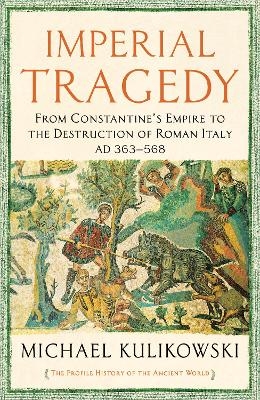
Imperial Tragedy
From Constantine’s Empire to the Destruction of Roman Italy AD 363-568
Seiten
2019
|
Main
Profile Books Ltd (Verlag)
978-1-78125-632-9 (ISBN)
Profile Books Ltd (Verlag)
978-1-78125-632-9 (ISBN)
- Titel erscheint in neuer Auflage
- Artikel merken
Two hundred years of Roman imperial politics and power brought to life in an action-packed narrative.
For centuries, Rome was one of the world's largest imperial powers, its influence spread across Europe, North Africa, and the Middle-East, its military force successfully fighting off attacks by the Parthians, Germans, Persians and Goths. Then came the definitive split, the Vandal sack of Rome, and the crumbling of the West from Empire into kingdoms first nominally under Imperial rule and then, one by one, beyond it.
Imperial Tragedy tells the story of Rome's gradual collapse. Full of palace intrigue, religious conflicts and military history, as well as details of the shifts in social, religious and political structures, Imperial Tragedy contests the idea that Rome fell due to external invasions. Instead, it focuses on how the choices and conditions of those living within the empire led to its fall. For it was not a single catastrophic moment that broke the Empire but a creeping process; by the time people understood that Rome had fallen, the west of the Empire had long since broken the Imperial yoke.
For centuries, Rome was one of the world's largest imperial powers, its influence spread across Europe, North Africa, and the Middle-East, its military force successfully fighting off attacks by the Parthians, Germans, Persians and Goths. Then came the definitive split, the Vandal sack of Rome, and the crumbling of the West from Empire into kingdoms first nominally under Imperial rule and then, one by one, beyond it.
Imperial Tragedy tells the story of Rome's gradual collapse. Full of palace intrigue, religious conflicts and military history, as well as details of the shifts in social, religious and political structures, Imperial Tragedy contests the idea that Rome fell due to external invasions. Instead, it focuses on how the choices and conditions of those living within the empire led to its fall. For it was not a single catastrophic moment that broke the Empire but a creeping process; by the time people understood that Rome had fallen, the west of the Empire had long since broken the Imperial yoke.
Michael Kulikowski is Edwin Erle Sparks Professor of History and Classics at Penn State University, where his research and writing ranges widely across ancient and early medieval history. He is a regular contributor to the London Review of Books. His books include Rome's Gothic Wars, described by Bryn Mawr Classical Review as 'exceptional' and by Military History Review as 'breezy and animated, yet authoritative', and Imperial Triumph (Profile, 2016).
| Erscheinungsdatum | 19.09.2019 |
|---|---|
| Reihe/Serie | The Profile History of the Ancient World Series |
| Zusatzinfo | 16 page colour plate section |
| Verlagsort | London |
| Sprache | englisch |
| Maße | 162 x 240 mm |
| Gewicht | 743 g |
| Themenwelt | Geisteswissenschaften ► Geschichte ► Allgemeines / Lexika |
| Geschichte ► Allgemeine Geschichte ► Vor- und Frühgeschichte | |
| Geisteswissenschaften ► Geschichte ► Regional- / Ländergeschichte | |
| ISBN-10 | 1-78125-632-2 / 1781256322 |
| ISBN-13 | 978-1-78125-632-9 / 9781781256329 |
| Zustand | Neuware |
| Informationen gemäß Produktsicherheitsverordnung (GPSR) | |
| Haben Sie eine Frage zum Produkt? |
Mehr entdecken
aus dem Bereich
aus dem Bereich
auf den Spuren der frühen Zivilisationen
Buch | Hardcover (2023)
C.H.Beck (Verlag)
20,00 €
Konzepte – Methoden – Theorien
Buch | Softcover (2024)
UTB (Verlag)
39,90 €
Was Pompeji über uns erzählt
Buch | Hardcover (2023)
Propyläen (Verlag)
32,00 €


